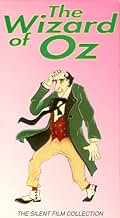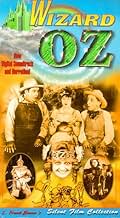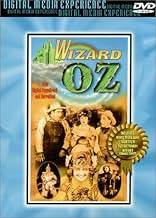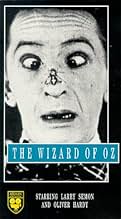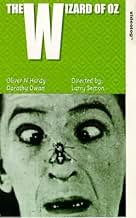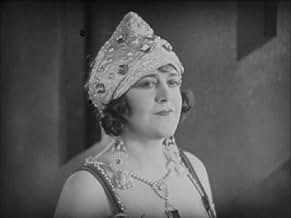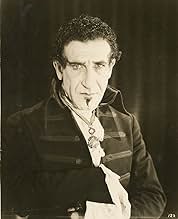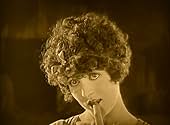NOTE IMDb
4,9/10
1,9 k
MA NOTE
Dorothy, l'héritière du trône d'Oz, doit le reprendre à l'abject Premier Ministre Kruel avec l'aide de trois ouvriers agricoles.Dorothy, l'héritière du trône d'Oz, doit le reprendre à l'abject Premier Ministre Kruel avec l'aide de trois ouvriers agricoles.Dorothy, l'héritière du trône d'Oz, doit le reprendre à l'abject Premier Ministre Kruel avec l'aide de trois ouvriers agricoles.
- Réalisation
- Scénario
- Casting principal
- Récompenses
- 1 victoire au total
Oliver Hardy
- Woodsman
- (as Oliver N. Hardy)
- …
Curtis 'Snowball' McHenry
- Snowball
- (as G. Howe Black)
- …
Rosalind Byrne
- Herald Trumpeter
- (non crédité)
Chester Conklin
- Undetermined Role
- (non confirmé)
- (non crédité)
Wanda Hawley
- Undetermined Role
- (non confirmé)
- (non crédité)
Jean Johnston
- Little Girl in open & close
- (non crédité)
Avis à la une
After its 1902 tryout in Chicago, the stage play with songs by Paul Tietjens and Baum opened on Broadway in January 1903, running 293 performances before hitting the road, and returning to Broadway for four or five months in 1904. It then toured until 1911, when Baum permitted a host of amateur companies all over America to stage the play. In many areas, it became an annual event.
As Mordaunt Hall noted in his rave review in The New York Times, this version is not based on Baum's 1900 novel but on his 1902 stage musical. Many of the strange changes and eliminations in both the story and the characters were made by Baum himself. In fact, aside from the obvious enlargement of Larry Semon's role with the addition of a goodly number of comic routines, this movie is a pretty faithful transcription of the play.
True, some of the best jokes (the business with packing cases, for example), are worked to exhaustion. The main problem I find, however, is not that the stage play and movie have been converted into slapstick, but that the movie without the songs is often rather dull, despite the best efforts of Oliver Hardy and Charlie Murray.
As Mordaunt Hall noted in his rave review in The New York Times, this version is not based on Baum's 1900 novel but on his 1902 stage musical. Many of the strange changes and eliminations in both the story and the characters were made by Baum himself. In fact, aside from the obvious enlargement of Larry Semon's role with the addition of a goodly number of comic routines, this movie is a pretty faithful transcription of the play.
True, some of the best jokes (the business with packing cases, for example), are worked to exhaustion. The main problem I find, however, is not that the stage play and movie have been converted into slapstick, but that the movie without the songs is often rather dull, despite the best efforts of Oliver Hardy and Charlie Murray.
I'm probably gonna get bashed by all you other Oz fans out there for writing this review, but who cares! I grew up watching the 1939 version and didn't know about this one until about 16 months ago. About 3 months ago, I got the DVD, I sat down, watched it, and laughed my fool head off. Okay! Okay! It doesn't follow the version we're all "used to watching". Anybody ever heard of a little variety? Well here it is.
There are a few downsides though. First off, there's no Toto, no "I don't think we're in Kansas anymore" line, no good witch/bad witch. Secondly, the DVD version has TERRIBLE music. But Jacqueline Lovell certainly adds something with her narration. If they were to at least add even a piano score, or organ score even, it would have sounded much better.
Otherwise, altogether, this version of the classic tale by L. Frank Baum is good. Drawn out very much at times, but NOT THAT BAD!!! See it at least once, but don't expect anything, because if you do, you're gonna ruin it for yourself. Also it's in heavy need of restoration, any takers?? Please! For the good of Oz?!
There are a few downsides though. First off, there's no Toto, no "I don't think we're in Kansas anymore" line, no good witch/bad witch. Secondly, the DVD version has TERRIBLE music. But Jacqueline Lovell certainly adds something with her narration. If they were to at least add even a piano score, or organ score even, it would have sounded much better.
Otherwise, altogether, this version of the classic tale by L. Frank Baum is good. Drawn out very much at times, but NOT THAT BAD!!! See it at least once, but don't expect anything, because if you do, you're gonna ruin it for yourself. Also it's in heavy need of restoration, any takers?? Please! For the good of Oz?!
I approached this film with great interest. Being a fan of Oz in general and silent film in particular, this seemed like a sure fit. Well, it's hard to put all prejudices aside, having (like most people) been bombarded with various adaptations of L. Frank Baum's book that one naturally has preconceptions.
Now, I won't bother to comment on the liberties taken in this film, the 1939 film bears, in all truth, barely a passing resemblance to Baum's dark and bizarre novel. The problem is, the changes made for this film just don't work. It's really just a standard silent slapstick film, but not a very funny one.
It's hard to sit through 90 minutes of lame jokes and vulgar stereotypes. But, as a historical curiosity, the film merits a once-over. I cannot, however, endorse the release pictured on the IMDb page, with it's "Digital Soundtrack" and "Narration." The music is inappropriate and the narration is silly...I mean, I CAN read for myself thank you! It was like sitting in the theatre with some rude patron talking to the screen! I expect this was added for children watching the films, but I really don't think many young children today would sit through this, sadly.
See it at least once, but don't expect too much from it.
Now, I won't bother to comment on the liberties taken in this film, the 1939 film bears, in all truth, barely a passing resemblance to Baum's dark and bizarre novel. The problem is, the changes made for this film just don't work. It's really just a standard silent slapstick film, but not a very funny one.
It's hard to sit through 90 minutes of lame jokes and vulgar stereotypes. But, as a historical curiosity, the film merits a once-over. I cannot, however, endorse the release pictured on the IMDb page, with it's "Digital Soundtrack" and "Narration." The music is inappropriate and the narration is silly...I mean, I CAN read for myself thank you! It was like sitting in the theatre with some rude patron talking to the screen! I expect this was added for children watching the films, but I really don't think many young children today would sit through this, sadly.
See it at least once, but don't expect too much from it.
Even in it's day, I think that this movie would have been looked on as rather average. It just isn't a patch on the classic 1939 version. The scarecrow, the tin man and the cowardly lion are not characters, but rather disguises that three of the characters "put on". And there is no witch at all. [Margaret Hamilton, we miss you.] Although the plot is good, the way it's done would confuse younger children, and it somehow just doesn't hold up. It is interesting to see, only for its historic aspect.
This is a pretty weird adaptation of the "Wizard of Oz", bearing only a passing resemblance either to the original book or to the beloved Judy Garland version. The story is much different, and the characters look and act much differently. Frankly, most of it isn't really very good, although for those who enjoy silent films there are some points of historical interest.
Instead of the more familiar story of young Dorothy's trip to Oz, the scenario here has a melodrama centering on a somewhat older Dorothy (Dorothy Dwan), combined with some slapstick involving the Oz characters. In itself, it's not necessarily a big problem to adapt the story (after all, the great 1939 version also made some significant changes from the book), but this one does not really fit together very well, and it certainly does not work as well as the more familiar story. It really looks as if Larry Semon just tried far too hard to put his own personal stamp on the story, instead of simply trying to make a good movie version of the Wizard. It's interesting to see Oliver Hardy as the Tin Woodman, but he doesn't really get a lot to do, and a number of the other characters are ill-conceived, and do not work out well at all. It's also plagued with a lot of excruciating puns in the title cards, plus other similar problems.
Some of the finest movies ever made came from this era, when the silents were at their peak, and it should have been possible to make a first-rate adaptation of the Oz story, but unfortunately this isn't it. With its overdone attempts at humor and melodrama, it looks more like the stereotyped images of silent movies that are held by so many ill-informed modern moviegoers. For silent movie fans, there are still a couple of points of interest that might make it worth watching in order to satisfy one's curiosity, but otherwise there's really no particular reason to see it.
Instead of the more familiar story of young Dorothy's trip to Oz, the scenario here has a melodrama centering on a somewhat older Dorothy (Dorothy Dwan), combined with some slapstick involving the Oz characters. In itself, it's not necessarily a big problem to adapt the story (after all, the great 1939 version also made some significant changes from the book), but this one does not really fit together very well, and it certainly does not work as well as the more familiar story. It really looks as if Larry Semon just tried far too hard to put his own personal stamp on the story, instead of simply trying to make a good movie version of the Wizard. It's interesting to see Oliver Hardy as the Tin Woodman, but he doesn't really get a lot to do, and a number of the other characters are ill-conceived, and do not work out well at all. It's also plagued with a lot of excruciating puns in the title cards, plus other similar problems.
Some of the finest movies ever made came from this era, when the silents were at their peak, and it should have been possible to make a first-rate adaptation of the Oz story, but unfortunately this isn't it. With its overdone attempts at humor and melodrama, it looks more like the stereotyped images of silent movies that are held by so many ill-informed modern moviegoers. For silent movie fans, there are still a couple of points of interest that might make it worth watching in order to satisfy one's curiosity, but otherwise there's really no particular reason to see it.
Le saviez-vous
- AnecdotesMany theatres that booked the film never received it because its production caused Chadwick Pictures to go bankrupt, and distribution ceased long before it was intended to.
- GaffesThe plane that brings Kruel's emissaries from Oz to Kansas is a triplane in midair but a biplane when it lands.
- Citations
Prime Minister Kruel: Do your stuff, Wizzy!
- Versions alternatives2005 DVD release on Warner Brothers (as a bonus feature with the 1939 version) alternates between sepia tone-colored images and blue-tinted images.
- ConnexionsFeatured in Wiz on Down the Road (1978)
Meilleurs choix
Connectez-vous pour évaluer et suivre la liste de favoris afin de recevoir des recommandations personnalisées
Détails
- Durée1 heure 35 minutes
- Mixage
- Rapport de forme
- 1.33 : 1
Contribuer à cette page
Suggérer une modification ou ajouter du contenu manquant

Lacune principale
By what name was Le Prince qu'on sort (1925) officially released in India in English?
Répondre

